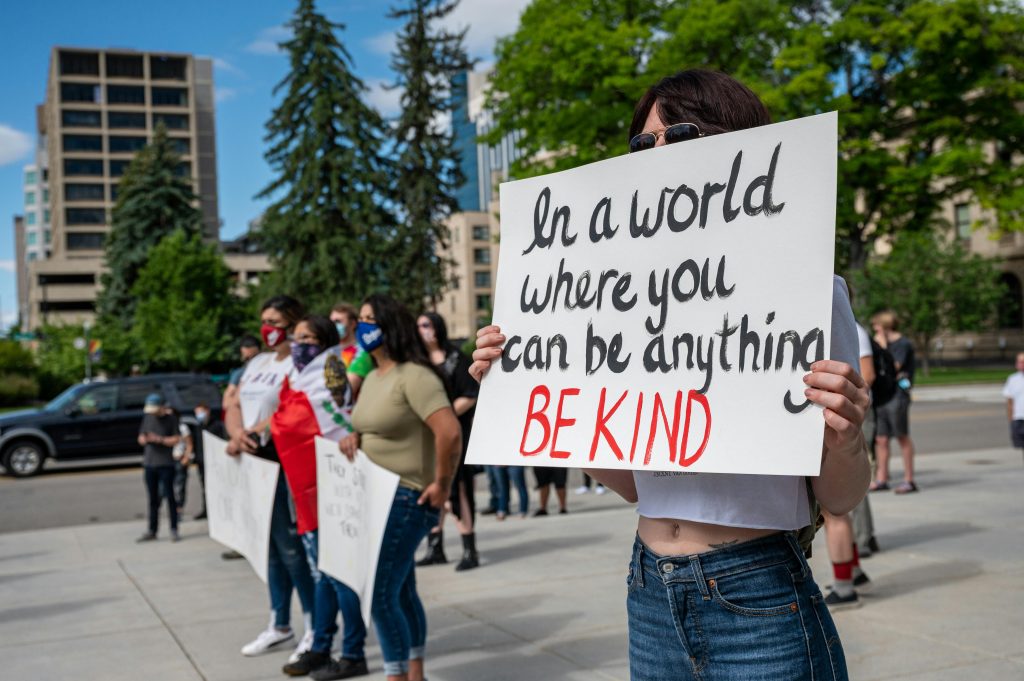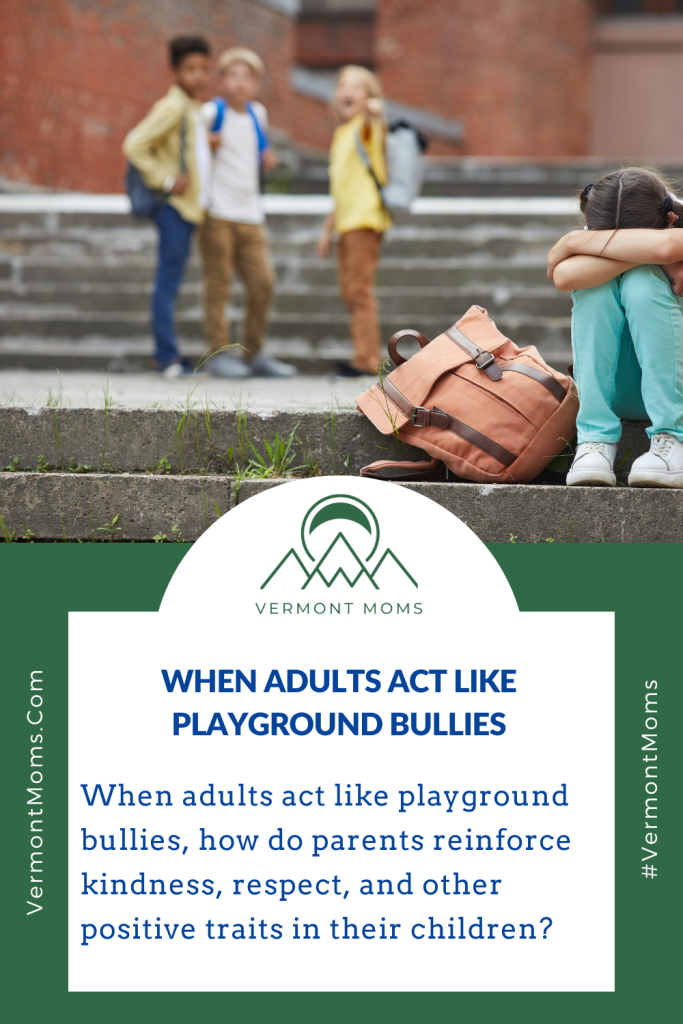I taught my kids to be respectful, kind, and accountable. But in a world where all I see is the proliferation and acceptance of bad behavior, much of it coming from people in positions of leadership, I find myself asking, “How do we continue to raise decent humans when adults act like playground bullies?”

Another way to think of it is that when adults act like playground bullies, how do parents reinforce kindness, respect, and other positive traits in their children?
When my kids were little, I ingrained in them the basic standards of kindness:
- Say please and thank you
- Listen before you speak
- Don’t interrupt
- Just because someone is mean, do not sink to their level
- Be kind and stand up for what is right, even if it means you might get picked on too.
These values have shaped my children into smart, kind, considerate young people. But now, more than ever, they’re being tested, not by classmates on the playground, but when they see adults act like playground bullies on screens, stages, and in leadership roles.
When I look around today, I feel like we have become a “Do as I say, not as I do” society. But you better believe that our kids are watching everything we do!
We tell kids to get off their screens while scrolling our own phones. We expect them to be calm and polite in public while we talk loudly into earbuds. We ban violence but train them for active shooter drills in schools. We preach kindness, but then model sarcasm and snide remarks online in “battles of words.” Kids notice these behaviors, and they learn not from what we say, but from what we do.
When adults act like playground bullies, the message is confusing; we’re asking children to follow rules we’re not even following ourselves. And when the adults in the highest offices behave badly, it becomes even harder to explain why kindness matters.
Instead of disagreement with dignity and mutual respect, we are surrounded by infantile insults. Instead of healthy debate, we hear petty name-calling. Our leaders resort to mocking, shaming, and using slurs and sarcastic taunts instead of real dialogue.
Recent examples? Let’s take a look:
- President Biden called President Trump a “loser,” saying in a speech, “Losers are taught to concede when they lose… and he’s a loser.”
- Trump, in turn, has said Biden has a “Very low IQ,” is “Close to the vegetable stage,” and he frequently labels opponents to his views as “stupid,” “weak,” or “lunatics” while touting himself as “great” and “a savior.”
- Trump and Vance mocked Ukrainian President Zelensky’s clothing and insisted he say “thank you” for aid after inviting him to a public forum, as if humility and gratitude were a PR stunt.
- In a heated social media exchange over the spending bill, Trump told Elon Musk to “Close up shop and go back to South Africa.”
- Deputy Chief of Staff Stephen Miller recently belittled protesters in Washington, D.C. as “crazy communists”. “We’re going to ignore these stupid white hippies that all need to go home and take a nap because they’re all over 90 years old
These aren’t anonymous internet trolls. These are adults with microphones, platforms, and power who are behaving in ways that wouldn’t fly in a third-grade classroom. And the list of examples of this vicious, playground bullying is endless and constant.
How do I keep telling my kids, “That’s not okay,” when this horrible behavior is everywhere? After all, if everyone else is doing it, why can’t they do it too? And, it seems like much of our society is standing up, sensationalizing, and cheering these deplorable displays! I am horrified to see adults act like playground bullies.
Maybe I am old-fashioned and out of touch, but I do not think bullying, insults, intimidation, and slurs are how we should communicate. Kindness matters to me, and I model my beliefs in my own actions. Character counts and cruelty cannot become the norm. It definitely will not be in my home!
Here are some ways I address my children when adults act like playground bullies:
- Point out the behavior and talk about it: When children see something hurtful and cruel, talk to them about how just because a person is in power, it does not make it okay to talk that way. Reflect on the words, not the person, and point out why it is unacceptable behavior.
- Encourage reflection: Ask how it would make them feel if they were in a situation and words like that were being used against them. What could be better words or ways to approach the conversation? Build empathy and resilience in your children.
- Model alternatives: Talk about how you would react, and ensure you model similar behavior. I don’t let online nastiness go unanswered, but I always respond thoughtfully and without direct insult. My goal is to show that calm, respectful words are more powerful than cheap shots. The adage, “You catch more flies with honey than with vinegar,” goes a long way to express that being kind and pleasant is more effective in influencing people than being harsh.
Let’s ensure our next generation understands values, kindness, and consideration. To achieve this, you might consider something tangible like a “Kindness Pledge” with your family that you can review weekly. My family has the following:
Our Family Commitment to Lead with Kindness – Even When the World Doesn’t
I pledge to be kind in my words, my actions, and my heart.
I will speak with respect, even when I feel angry.
I will listen with care, even when I don’t agree.
I will not use words to hurt or shame.
I will not encourage or follow others who choose cruelty.
I will think for myself and choose what I know is right.
I know that kindness is not weakness. It is courage. It is leadership. It is strength.
This week, I will look at the world around me and ask: Was that kind?
And I will remember that I can be better, no matter what anyone else is doing.
I pledge to choose kindness.
Print and sign your pledge, say it out loud together, and evaluate it weekly. Discuss at dinner what kind acts you saw this week, where you saw people not being kind, how that made you feel, and how you kept (or maybe didn’t keep) your pledge this week?
And finally, be sure to reiterate to your kids: Kindness Is Not Weakness
The biggest lie being told in today’s public discourse is that kindness is weakness. That respect is soft. That shouting is strength.
But we know better, don’t we? These qualities are antidotes to when adults act like playground bullies.
We know it takes real courage to respond to vitriol with grace. It takes strength to hold your tongue. And it takes power, real power, to lift others up instead of tearing them down.
While the world might be getting louder and meaner, I’m doubling down on kindness. I’m raising kids who know how to lead with empathy, even when adults act like playground bullies! At the end of the day, the future isn’t just shaped by the media and elections. It’s shaped at the dinner table, during bedtime talks, in afterschool car rides, and yes, through the quiet, stubborn work of parents trying to raise good humans in a not-so-good moment.
Pin this post and be sure to follow Vermont Moms on Pinterest!
Vermont Moms Insiders get exclusive content, so sign up today!











